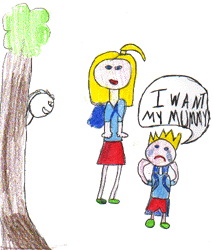
September 7, 2017 10:32 am School for the First Time
It’s that time of year again, when children go back to school, or start at a new one. Many of our youngest will attend school for the first time, and at a very young age. Two and three-year-olds who have never been to school before are in for what can initially be a traumatic experience. There is a happy ending, however.
Starting nursery school means watching your mom or beloved caregiver walk away and leave you with strangers. It means sharing the attention of the teacher(s) with a whole group rather than being the center of attention. It usually involves being with multiple crying children. It is stressful, scary, and lonely. If the child is non-verbal or has hard-to-understand speech, he may feel as if he has been abandoned in a foreign country.
Young children react uniquely to starting school. Some cry from the beginning to the end of the school day. Nothing can distract or pacify them. On the second day, the child will begin crying in the car, or as he leaves home. Others walk in with confidence on the first day, have a seemingly good time, and then collapse on day two or three when they realize the arrangement is permanent. Getting used to a new situation takes time; some get there sooner than others.
If you are the parent of one of these children, you are understandably upset. Having enrolled your child in a great school, you are shocked at how much he or she does not want to be there. It is really important that you not communicate your upset feeling to the child, nor should you criticize the teacher or the school. It will make him or her even more anxious and afraid of being in a bad place. Instead, be positive and project confidence. “Ms. X is a nice person, she will take good care of you.” “I know you’ll have a good time, and I’ll see you soon.” “I’ll miss you too, but you are in good hands.” It’s great to provide a happy plan for after school. “When I pick you up, we can go to the beach for a while.”
If he needs you to stay for a few minutes at drop off, do just that, but make it clear that you are not going to be staying long. When you decide to go, say goodbye (do not sneak out when he is distracted), give a hug and leave. Even if he cries, and throws himself on the floor, do not return to the classroom. Go, and give the teachers a chance to comfort him and earn his trust.
You might want to consider shortening the day so the child doesn’t suffer too long. Just saying you will come back early may make a big difference in the way she feels. If the teacher doesn’t mind, you can hang around a bit in the class or playground when you pick up, so she has some fun and leaves on a good note.
Probably the most important thing to keep in mind is that your child won’t be distraught forever. Sooner or later, in days or a few weeks, if you remain positive and consistent, your child will adjust. School will start to be fun, he will bond with the teacher and trust her to keep him safe. He will begin to like a few classmates, and the torture will be over. Before you know it, your child will walk eagerly and happily into school. You will breathe a huge sigh of relief, and realize a developmental milestone has been reached.
Marianne Riess is the former head of the Putnam Indian Field School in Greenwich, CT. She has 40 years of experience in working with young children.




